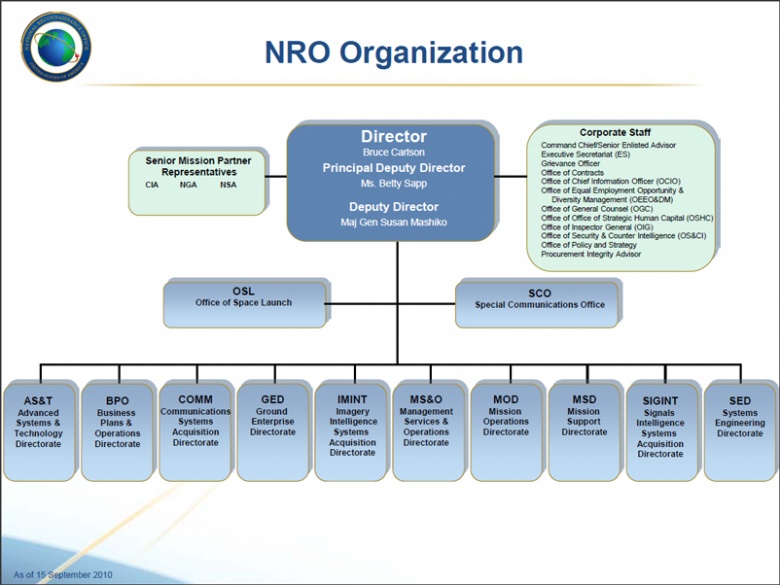National Reconnaissance Office
| Motto | "Supra Et Ultra" (Above And Beyond) |
|---|---|
| Parent organization | US/Department/Defense |
| Purpose/focus | To ensure that the US has the technology and spaceborne and airborne assets needed to acquire intelligence worldwide. |
| Headquarters | Chantilly, Virginia |
| Subgroups | • Office of Space Launch • Special Communications Office • Advanced Systems & Technology Directorate • Business Plans & Operations Directorate • Communications Systems Acquisition Directorate • Ground Enterprise Directorate • Imagery Intelligence Systems Acquisition Directorate • Management Services & Operations Directorate • Mission Operations Directorate • Mission Support Directorate • Signals Intelilgence Systems Acquisition Directorate • Systems Engineering Directorate |
| Staff | 3,000 |
| Interest of | National Underwater Reconnaissance Office |
| Member of | United States Intelligence Community |
| Subpage | •National Reconnaissance Office/Director |
The National Reconnaissance Office (NRO) is an agency of the US Department of Defense.
Organisation
9/11 Exercises
The National Reconnaissance Office had scheduled an exercise for September 11, 2001 due to start at 9 a.m. involving a corporate jet crashing into one of the four towers of the NRO Headquarters in Chantilly, Virginia. An NRO spokesman, Art Houbold said that "It was just an incredible coincidence that this happened to involve an aircraft crashing into our facility."[1][2]
Cover up
News of the 9/11 Chantilly aircraft crashing simulation was not made public until almost a year later, in the form of a simple announcement of a Homeland Security Conference. The latter entitled “Homeland Security: America’s Leadership Challenge” was held in Chicago on September 6, 2002.[3]
Related Quotation
| Page | Quote | Author | Date |
|---|---|---|---|
| Australia/1975 coup d'état | “There were a number of points of tension between Whitlam's government and the United States intelligence apparatus. Whitlam had close ties with the United States, in 1964 receiving a "Leader" travel grant from the U.S. Department of State to spend three months studying under U.S. government and military officials.
After coming to power, Whitlam quickly removed the last Australian troops from Vietnam. Whitlam government ministers criticised the US bombing of North Vietnam at the end of 1972. The US complained diplomatically about the criticism. In March 1973, US secretary of State William Rogers told Richard Nixon that "the leftists [within the Labor Party would] try to throw overboard all military alliances and eject our highly classified US defence space installations from Australia". In 1973, Whitlam ordered the Australian security organisation ASIS to close its operation in Chile, where it was working as a proxy for the CIA in opposition to Chile's president Salvador Allende. Whitlam's Attorney-General Lionel Murphy used the Australian Federal Police to conduct a raid on the headquarters of the Australian Security Intelligence Organisation (ASIO) in March 1973. CIA Chief of Counter-Intelligence, James Angleton, later said Murphy had "barged in and tried to destroy the delicate mechanism of internal security". Australian journalist Brian Toohey said that Angleton considered then Australian Prime Minister Gough Whitlam a "serious threat" to the US and was concerned after the 1973 raid on ASIO headquarters. In 1974, Angleton sought to instigate the removal of Whitlam from office by having CIA station chief in Canberra, John Walker, ask the director general of ASIO, Peter Barbour, to make a false declaration that Whitlam had lied about the raid in Parliament. Barbour refused to make the statement. In 1974, Whitlam ordered the head of ASIO, Peter Barbour, to sever all ties with the CIA. Barbour ignored Whitlam's order and contact between Australian and US security agencies was driven underground. Whitlam later established a royal commission into intelligence and security. Jim Cairns became Deputy Prime Minister after the 1974 election. He was viewed by US secretary of state Henry Kissinger and defence secretary James Schlesinger as "a radical with strong anti-American and pro-Chinese sympathies". The US administration was concerned that he would have access to classified United States intelligence. Whitlam instantly dismissed ASIS chief WT Robinson in 1975 after discovering ASIS had assisted the Timorese Democratic Union in an attempted coup against the Portuguese administration in Timor, without informing Whitlam's government. Whitlam threatened to reveal the identities of CIA agents working in Australia. He also threatened not to renew the lease of the US spy base at Pine Gap, which was due to expire on 10 December 1975. The US was also concerned about Whitlam's intentions towards its spy base at Nurrungar.” | Wikipedia | 2022 |
References
- ↑ NRO Emergency Response to a Small Aircraft Crash, Exercise Concept, 9/11 Commission Documents, Team 8, Box 16, Misc-Work-Paper-Fdr-NRO-Exercise-Plane-Crash-Into-Building, #809
- ↑ http://www.historycommons.org/entity.jsp?entity=national_reconnaissance_office
- ↑ http://www.globalresearch.ca/7-7-mock-terror-drill-what-relationship-to-the-real-time-terror-attacks/821
